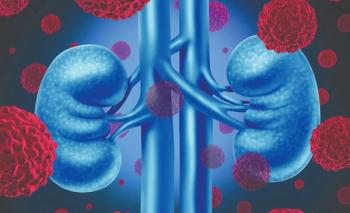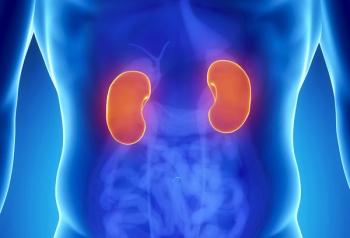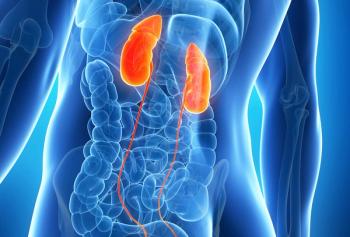
The final analysis of the phase 3 IMmotion151 trial did not reveal a significant improvement in overall survival with atezolizumab plus bevacizumab over sunitinib for previously untreated patients with metastatic renal cell carcinoma.

Your AI-Trained Oncology Knowledge Connection!


The final analysis of the phase 3 IMmotion151 trial did not reveal a significant improvement in overall survival with atezolizumab plus bevacizumab over sunitinib for previously untreated patients with metastatic renal cell carcinoma.

The CheckMate 648 trial found that using a combination of nivolumab and chemotherapy or nivolumab plus ipilimumab vs chemotherapy alone improved survival in advanced esophageal squamous-cell carcinoma.

OQ011, a topical ointment for hand-foot skin reaction-related pain, yielded positive safety and efficacy in part 1 of 2 phase 2 NOVA-II trial.

Patients who underwent allogeneic hematopoietic cell transplantation using younger matched unrelated donors had a better disease-free survival compared who those who used older matched sibling donors.

Patients with HER2-low metastatic breast cancer achieved clinically meaningful improvement in progression-free survival following treatment with fam-trastuzumab deruxtecan-nxki.

The recommended dose of ceritinib once daily with food demonstrated promising preliminary clinical activity in patients with ALK-positive relapsed/recurrent inflammatory myofibroblastic tumors and anaplastic large cell lymphoma, and certain subsets of relapsed/refractory neuroblastoma.

The FDA has granted IO-202, a LILRB4 checkpoint inhibitor, fast track designation for the treatment of relapsed or refractory acute myeloid leukemia.

The FDA designated the FoundationOne CDx assay as a companion diagnostic for identifying tumors that are microsatellite instability–high and may benefit from pembrolizumab.

A new drug application has been accepted by the FDA for poziotinib in patients with advanced or metastatic non–small cell lung cancer with HER2 exon 20 insertion mutations.

Efficacy of adjuvant mitotane for patients with adrenocortical carcinoma following surgery was presented at 2022 ASCO GU.

Data from a phase 2 trial of atezolizumab with or without radiotherapy showed some antitumor activity in advanced squamous cell carcinoma of the penis, despite failing to meet the primary end point of progression-free survival.

Updated data from the KEYNOTE-564 trial that were reported at 2022 ASCO GU show continuous disease-free survival advantage with pembrolizumab vs placebo as adjuvant therapy for renal cell carcinoma.

Data from the NeoAvAx trial presented at 2022 ASCO GU show potential for neoadjuvant avelumab plus axitinib for high-risk, non-metastatic clear-cell renal cell carcinoma.

Retrospective trial results inform utility of tivozanib in the real-world treatment of renal cell carcinoma.

Better health-related quality of life outcomes were associated with nivolumab and cabozantinib for advanced renal cell carcinoma vs sunitinib.

A surrogate for toxicity and drug exposure, cabozantinib dose reductions were tied to longer durations of time to treatment failure and overall survival for patients with metastatic renal cell carcinoma.

Treatment with cabozantinib in the second line yielded responses in patients with advanced renal cell carcinoma who received immunotherapy in the frontline, regardless of prior regimen.

Subgroups analysis from the CLEAR trial of lenvatinib plus pembrolizumab showed efficacy results were consistent between East Asian patients and the overall study population.

Adding olaparib to durvalumab did not significantly improve progression-free survival for patients with previously untreated, platinum-ineligible metastatic urothelial carcinoma.

Data presented at 2022 ASCO GU of front nivolumab plus cabozantinib for renal cell carcinoma show persistent overall survival benefit versus sunitinib.

New findings indicate that treatment with cabozantinib following failure of immunotherapy proved to be safe and feasible in metastatic renal cell carcinoma.

Rates of progression-free survival at 3- and 4-year landmarks significantly improved with tivozanib vs sorafenib for relapsed or refractory RCC.

Data from the TITAN-RCC trial presented at 2022 ASCO GU showed that certain immune cell–related parameters may be predictive of response to nivolumab/ipilimumab in advanced or metastatic clear cell renal cell carcinoma

Data from cohort H of the EV-103 study highlighted the promising antitumor activity of neoadjuvant enfortumab vedotin for patients with muscle-invasive bladder cancer who are cisplatin-ineligible.

Chung-Han Lee, MD, PhD, spoke about using biomarkers to help predict responses in patients with metastatic renal cell carcinoma treated on the KEYNOTE-146 study.

Research suggests patients with advanced renal cell carcinoma who received neoadjuvant cabozantinib saw reductions in tumor size with no disease progression.

Patients with checkpoint inhibitor–naïve metastatic urothelial cancer appeared to experience promising anti-tumor activity following treatment with second line sacituzumab govitecan and pembrolizumab.

Patients with previously treated metastatic urothelial carcinoma or renal cell carcinoma experienced promising benefit from treatment with niraparib and cabozantinib.

At 2022 ASCO GU, early trial results show promise for fluorodeoxyglucose and sodium fluoride PET/CT prognostic ability to predict survival in patients with metastatic genitourinary malignancies treated with cabozantinib plus PD-1/CTLA-3 inhibition.
![A statistically significant benefit in terms of radiographic progression-free survival (rPFS) was noted with the use of olaparib (Lynparza) vs placebo in combination with abiraterone acetate (Zytiga) for patients with frontline metastatic castration-resistant prostate cancer (mCRPC), according to results of the phase 3 PROpel trial (NCT03732820) that were presented at the 2022 Genitourinary Cancers Symposium.1 The median investigator-assessed rPFS was 24.8 months with olaparib/abiraterone vs 16.6 months with placebo/abiraterone (HR, 0.66; 95% CI, 0.54-0.81; P <.0001), which translated to a 34% reduction in the risk of radiographic disease progression or death. The 1- and 2-year rPFS rates were 71.8% and 51.4% in the olaparib/abiraterone arm, respectively; these rates were 63.4% and 33.6% with placebo/abiraterone, respectively. When evaluated by blinded independent central review, the median rPFS with olaparib/abiraterone was 27.6 months vs 16.4 months with placebo/abiraterone, leading to a 39% reduction in the risk of radiographic disease progression or death (HR, 0.61; 95% CI, 0.49-0.74; P <.0001). The 1- and 2-year rPFS rates with olaparib plus abiraterone were 73.8% and 53.7%, respectively. In the placebo/abiraterone arm, these rates were 60.6% and 34.1%, respectively. Lead study author Fred Saad, MD, FRCS, said that PROpel is the first combination approach to deliver consistent clinical benefits for patients in the first-line mCRPC setting, irrespective of homologous recombination repair (HRR) mutation status. “This benefit led to what I think is the longest rPFS we have seen to date in metastatic CRPC beyond 2 years,” Saad, who is professor and chairman of urology and director of Genitourinary Oncology at the University of Montreal Hospital Center, as well as the Raymond Garneau Chair in Prostate Cancer Research and director of Clinical Research and the Molecular Oncology Research Laboratory in Prostate Cancer, said in a presentation during the meeting. Patients with mCRPC who are treated in the frontline setting have a median survival of approximately 3 years in clinical trial settings, Saad noted, adding that about half of patients in real-world practice only receive 1 line of active treatment. Here, the median survival is less than 2 years, underscoring an unmet need to improve outcomes in the up-front setting. Previously, data with olaparib in mCRPC have shown encouraging results. The phase 3 PROfound trial (NCT02987543) demonstrated significantly prolonged rPFS and overall survival (OS) in patients with mCRPC following a next-generation hormonal agent (NHA) with HRR gene alterations.2 Additionally, a phase 2 trial (NCT01972217) of olaparib and abiraterone showed prolonged investigator-assessed rPFS vs placebo/abiraterone in patients with mCRPC following treatment with docetaxel, regardless of HRR status (HR, 0.65; 95% CI, 0.44-0.97; P = .034).3 In the international, double-blind, phase 3 PROpel trial, investigators randomized patients with mCRPC in the first-line setting 1:1 to receive olaparib at 300 mg twice daily plus abiraterone at 1000 mg daily (n = 399) or placebo and abiraterone at 1000 mg daily (n = 397). Patients could have received docetaxel in the metastatic hormone-sensitive prostate cancer (mHSPC) setting, but no prior abiraterone was allowed. Other NHAs were permitted if they were stopped at least 12 months prior to study enrollment. Patients also had ongoing androgen deprivation therapy and an ECOG performance status of 0 or 1. Stratification factors included site of distant metastases (bone-only vs visceral vs other) and prior taxane in the mHSPC setting (yes vs no). The primary end point was investigator-assessed rPFS, with OS as a secondary end point. Additional outcome measures included time to first subsequent therapy or death (TFST), time to second progression or death (PFS2), objective response rate (ORR), HRR mutation prevalence (retrospective testing), health-related quality of life, and safety and tolerability. Baseline characteristics were well-balanced between the 2 arms. The median age was 69.5 years (range, 43-91), and most patients had an ECOG performance status of 0 (70.1%). Of note, symptomatic patients (Brief Pain Inventory-Short Form ≥4 and/or opiate use) comprised 25.8% and 20.2% of olaparib- and placebo-treated patients, respectively; 22.5% of patients had received docetaxel at the mHSPC stage. Additionally, patients either had HRR mutations (27.8% with olaparib vs 29.0% with placebo), non-HRR mutations (69.9% vs 68.8%, respectively), or unknown HRR mutation status (2.3% each). The median PSA was 17.90 ug/L (interquartile range [IQR], 6.09-67.00) with olaparib/abiraterone and 16.81 ug/L (IQR, 6.26-53.30) with placebo/abiraterone. Most metastases occurred in the bone at 87.5% and 85.4% of patients, respectively. Additional findings showed that the rPFS benefit was observed across all prespecified subgroups, including age (<65 years, HR, 0.51; 95% CI, 0.35-0.75; ≥65 years, HR, 0.78; 95% CI, 0.62-0.98), site of distant metastases (bone-only, HR, 0.73; 95% CI, 0.54-0.98; visceral, HR, 0.62; 95% CI, 0.39-0.99; other, HR, 0.62; 95% CI, 0.44-0.85) prior docetaxel (yes, HR, 0.61; 95% CI, 0.40-0.92; no, HR, 0.71; 95% CI, 0.56-0.89) and HRR mutation status (HRR mutant, HR, 0.50; 95% CI, 0.34-0.73; non–HRR mutant, HR, 0.76; 95% CI, 0.60-0.97). “We did do a global interaction test, which was not significant,” Saad added. OS data, which were at 28.6% maturity, showed that the median OS was not reached in either arm but trended toward improved survival with olaparib/abiraterone vs placebo/abiraterone (HR, 0.86; 95% CI, 0.66-1.12; prespecified 2-sided alpha P = .29). TFST also was favored with the addition of olaparib. The median TFST was 25.0 months in the olaparib/abiraterone arm compared with 19.9 months with placebo/abiraterone (HR, 0.74; 95% CI, 0.61-0.90; P = .004). Furthermore, the median PFS2 was not reached in either arm, but supported longer-term benefit with olaparib/abiraterone (HR, 0.69; 95% CI, 0.51-0.94; P = .0184). When evaluated for response, the ORR with olaparib plus abiraterone was 58.4% with a 4.3% complete response (CR) rate and a 54.0% partial response (PR) rate. The stable disease (SD) rate was 26.1% and the progressive disease (PD) rate was 13.7%. In the placebo/abiraterone arm, the ORR was 48.1%, which comprised a 6.3% CR rate and a 41.9% PR rate; the SD and PD rates were 28.1% and 19.4%, respectively. The odds ratio in ORR between olaparib/abiraterone and placebo/abiraterone was 1.60 (95% CI, 1.02-2.53; P = .0409). Saad noted that 40.3% of the overall study population had measurable disease via RECIST v1.1 criteria at baseline. Regarding safety, adverse effects (AEs) occurred in 97.2% and 94.9% of olaparib/abiraterone- and placebo/abiraterone-treated patients, respectively; grade 3 or higher AEs occurred in 47.2% and 38.4% of patients, respectively. AE-related deaths occurred in 4.0% (n = 16) of those on the olaparib arm compared with 4.3% (n = 17) of patients on the placebo arm. Dose interruptions and reductions occurred in 44.7% and 20.1% of patients who received the addition of olaparib; these rates were 25.3% and 5.6% for those on the placebo arm. Additionally, more patients discontinued olaparib due to an AE (13.8%) compared with 7.8% of patients receiving placebo. A total of 8.5% and 8.8% of patients in each arm, respectively, discontinued abiraterone due to an AE. There were no cases reported of myelodysplastic syndrome or acute myeloid leukemia, and the incidence of new primary cancers and pneumonitis were balanced between the 2 arms, Saad said. The AE profiles were consistent with the known toxicity profiles of the individual agents. The most common all-grade and grade 3 or higher AE with olaparib was anemia (46.0% and 15.1%, respectively). In the placebo arm, this occurred in 16.4% and 3.3% of patients, respectively. Cardiac failure occurred at similar rates between the 2 arms at 1.5% with olaparib and 1.3% with placebo; arterial thromboembolic events were also similar at 2.0% and 2.5%, respectively. However, numerically higher venous thromboembolic events were reported for olaparib/abiraterone (7.3%) vs placebo/abiraterone (3.3%), with pulmonary embolism being the most reported venous thromboembolic event (6.5% vs 1.8%, respectively). Pulmonary embolism events were mostly incidental findings via CT scans, and Saad added that this did not lead to treatment discontinuation with either olaparib or abiraterone. Quality of life was also found to be comparable between the 2 groups. References Saad F, Armstrong AJ, Thiery-Vuillemin A, et al. PROpel: phase III trial of olaparib (ola) and abiraterone (abi) versus placebo (pbo) and abi as first-line (1L) therapy for patients (pts) with metastatic castration-resistant prostate cancer (mCRPC). J Clin Oncol. 2022;40(suppl 6):11. doi:10.1200/JCO.2022.40.6_suppl.011 Hussain M, Mateo J, Fizazi K, et al. Survival with olaparib in metastatic castration-resistant prostate cancer. N Eng J Med. 2020;383(24):2345-2357. doi:10.1056/NEJMoa2022485 Clarke N, Wiechno P, Alekseev B, et al. Olaparib combined with abiraterone in patients with metastatic castration-resistant prostate cancer: a randomised, double-blind, placebo-controlled, phase 2 trial. Lancet Oncol. 2018;19(7):975-986. doi:10.1016/S1470-2045(18)30365-6](https://cdn.sanity.io/images/0vv8moc6/cancernetwork/d97c82ab46f3114f8f67bcbafa061ef7adad240a-1200x900.jpg?w=350&fit=crop&auto=format)
Results of the phase 3 PROpel trial presented at 2022 ASCO GU indicate a benefit of olaparib-based therapy for patients with metastatic castration-resistant prostate cancer receiving treatment in the frontline setting.